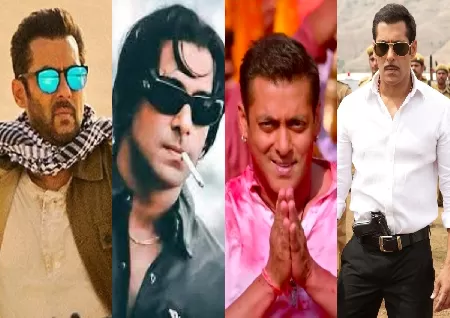Salman Khan's 35 Years: Redefining Fandom

Salman Khan, who will celebrate 35 years in the Hindi cinema industry on Tuesday, has unquestionably redefined what "muscular fandom" means. He has also distinguished himself as one of the select few celebrities whose fame is unaffected by their triumphs or failures.
'Biwi Ho Toh Aisi', which debuted 35 years ago today and gave Salman Khan his debut part in Hindi film, has a scene in which he is dancing. or something comparable. On a bed, he is moving his arms and legs about while a poster of Michael Jackson hangs on the wall in front of him. He is dressed in tight jeans and a vest. His biceps are buff, but not as rock-hard as they would be, and his hair is unkempt and shoulder length.
Nothing about his awkward debut, in which he comes across as just another Bollywood hopeful, hinted that he would go on to become one of the biggest stars in Hindi film.
The Farooq Shaikh-Rekha-Bindu starrer was one of those shrill saas-bahu fights that Ekta Kapoor revived much later to great acclaim, altering the face of Indian television. It was one of those high-pitched melodramas that Bollywood used to crank out at frighteningly frequent intervals.
That Salman followed up his completely awful debut with Sooraj Barjatya's massive blockbuster "Maine Pyar Kiya" (1989), which rewrote the rules of young romance in Bollywood, is actually quite a coincidence—the type movie gods enjoy. Prem, played by Salman, tells Bhagyashree's simpering Suman, "Dosti ka ek usool hai, madam, no sorry, no thank you," and that single statement virtually sealed the fate of those who loved to mind their ps and qs for all time.
great regard for family values Early hints in the Rajshri production revealed two things: Prem would grow into a widely used screen name for Loverboy Salman, and that bare chest, which kept popping up in flashes throughout the movie, would become such a strong signature that entire climaxes would be built around the moment Salman would go shirtless.
Salman's success from "Maine Pyar Kiya" has propelled him to such stratospheric heights that, with the exception of a few legal battles and black bucks, he's never truly recovered from it. Aamir, who also came from a well-known film family, had just had a big hit with the 1988 film "Qayamat Se Qayamat Tak." Salman and Aamir would have to wait a few more years for Shah Rukh to join them with the 1993 film "Deewana" in order to create the enduring Khandom that has shaped mainstream Bollywood and held us in thrall ever since.
Related queries to this article
- salman
- khan
- 35
- years
- redefining
- fandom
Read more articles and stories on InstaSity Movies.





